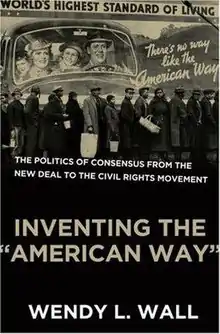Inventing the "American Way"
Inventing the "American Way": The Politics of Consensus from the New Deal to the Civil Rights Movement is a 2008 book by American historian Wendy L. Wall, a professor at Queen's University. It deals with postwar consensus politics and a national unity which developed from governmental response to the rise of communism and fascism.[1] Wall argues that national unity projects were forged, in order to unite Americans around what seemed to be their common values.[2]
 | |
| Author | Wendy L. Wall |
|---|---|
| Country | United States |
| Published | January 18, 2008 (Oxford University Press) |
| Pages | 400 |
| ISBN | 9780195329100 |
According to Kevin M. Kruse from Princeton University, Wall shows that "concepts most Americans now take for granted were created at mid-century to mask deep divisions in American society".[1] Projects such as the Freedom Train and Letters from America were built in support of capitalism and protection from other ideologies.[3]
According to Jeremi Suri from the University of Wisconsin, this book covers new ground in careful analysis of how "politicians, intellectuals, businesspeople, labor unions, and ethnic organizations worked—in shifting coalitions—to promote a predominant set of assumptions about citizenship and patriotism."
Awards
The book has received the Ellis W. Hawley Prize of the Organization of American Historians in 2008[4] and the Phi Alpha Theta Best First Book Award.[1]
References
- "Inventing the "American Way" Oxford University Press". Oxford University Press.
- Rossinow, Doug (2008-01-01). Wall, Wendy L. (ed.). "Forging Consensus". Reviews in American History. 36 (3): 449–455. JSTOR 40210946.
- Smith, Judith E. (2010-02-01). "Wendy L. Wall . Inventing the "American Way": The Politics of Consensus from the New Deal to the Civil Rights Movement . New York : Oxford University Press . 2008 . Pp. xi, 320. $35.00". The American Historical Review. 115 (1): 248–249. doi:10.1086/ahr.115.1.248. ISSN 0002-8762.
- "Organization of American Historians: Ellis W. Hawley Prize Winners". www.oah.org. Retrieved 2017-04-04.